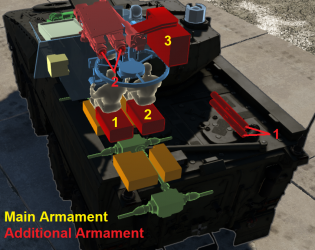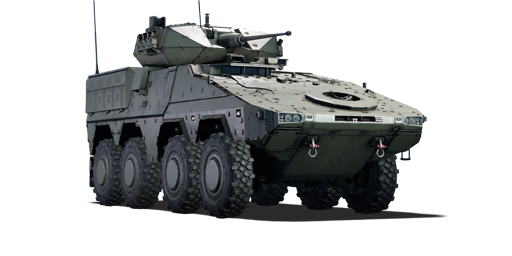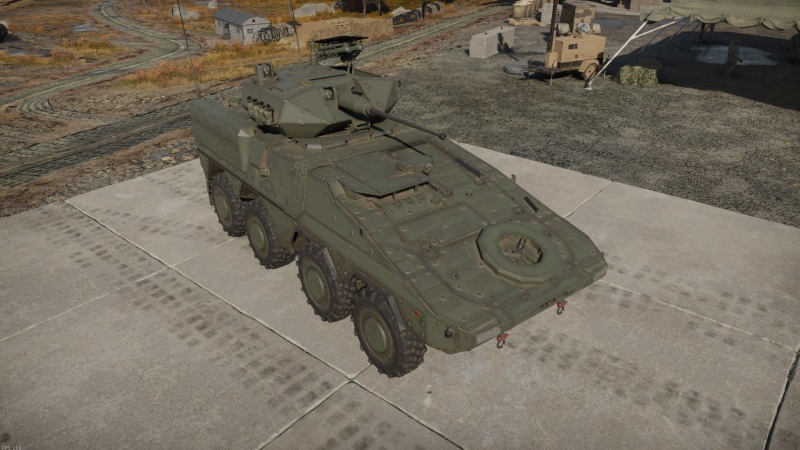Difference between revisions of "Vilkas"
(Undo revision 194188 by U130214443 (talk)) |
(→Ammo racks: Edits) |
||
| Line 130: | Line 130: | ||
|- | |- | ||
|} | |} | ||
| + | {{Clear}} | ||
=== Machine guns === | === Machine guns === | ||
Latest revision as of 10:23, 17 November 2024
Contents
Description
The Pėstininkų kovos mašina Vilkas is an armoured fighting vehicle used by Lithuania , which was developed in collaboration with ARTEC GmbH. The vehicle's roots trace back to the German-Dutch "Boxer AFV" program, showcasing a joint effort by European nations to enhance their armoured capabilities. The Vilkas variant, specifically tailored for Lithuania, integrates advanced technologies and offers versatility in combat scenarios. Entering service in the Lithuanian Armed Forces in 2019, the Vilkas deployment represents Lithuania's strategic investment in a contemporary armoured platform, capable of meeting the challenges of modern warfare.
The Vilkas (Lithuanian for "Wolf") is an event gift German light tank introduced during Update "Air Superiority" as a reward for the 2023 Winter Extreme event. The Vilkas is a unique light tank choice for German top-tier players, providing fire-and-forget Spike missiles for use against tanks at longer ranges or against nearby helicopters. As such, the Vilkas presents a new playstyle to players of the German ground tree, allowing them to rush to a good position using mobility, and play as a "sniper" with decent firepower and long-range missile, or perhaps play the vehicle more aggressively and use the Spike missiles for dispatching helicopters and long-range targets of opportunity when needed. All in all, the Vilkas is a uniquely interesting vehicle to bolster the top lineups of the German tech tree.
General info
Survivability and armour
Despite its composite screens covering the entire hull, the Vilkas does not offer particularly robust protection. While it can withstand high-calibre machine gun fire from the frontal aspect at all ranges, its sides and rear lack adequate armour coverage. Nevertheless, its armour proves invaluable in mitigating fragmentation damage from artillery strikes and rockets, setting it apart from other lightly armoured vehicles at its battle rating. One of the Vilkas's standout features is its spacious interior, which enhances survivability by reducing the likelihood of an instant kill from a singular hit. Additionally, the unmanned turret significantly bolsters its protection capabilities, allowing operators to engage targets without fear of immediate destruction. Even in the event of detonation of the cannon belts or Spike missile launchers, the platform remains resilient, further increasing survivability and sustaining operational effectiveness on the battlefield.
Armour type:
- Rolled homogeneous armour (Most of the hull structure)
- High hardness homogeneous armour (Turret, Lower glacis, Hull front roof, Parts of hull sides)
- Composite screen (Additional armour on hull sides and rear)
| Armour | Front (Slope angle) | Sides | Rear | Roof |
|---|---|---|---|---|
| Hull | 15 mm + 6-15 mm (73-80°) Upper Glacis 15 mm (53-65°) Lower Glacis |
15 mm + 38 mm (4-12°) Top 15 mm + 6-8 mm (0-33°) Bottom |
15 mm + 38 mm (0-7°) | 15 mm + 15 mm |
| Turret | 8 mm (45-52°) Turret front 38 mm Gun mantlet |
8 mm (16-35°) | 8 mm (0-30°) | 8 mm |
Notes:
- Wheels and suspension - 10 mm (Chassis)
- Gun mount - 38 mm (Cast homogeneous armour)
Mobility
The Vilkas boasts a commendable power-to-weight ratio of 24.7, endowing it with remarkable speed and agility despite its considerable size and profile. Its off-road capabilities and superb top speed contribute to its versatility on the battlefield, allowing for swift manoeuvres and rapid responses to changing tactical situations. Additionally, the Vilkas maintains a decent reverse speed, further enhancing its mobility and operational effectiveness in dynamic environments.
| Game Mode | Max Speed (km/h) | Weight (tons) | Engine power (horsepower) | Power-to-weight ratio (hp/ton) | |||
|---|---|---|---|---|---|---|---|
| Forward | Reverse | Stock | Upgraded | Stock | Upgraded | ||
| Arcade | Expression error: Unexpected * operator. | 1,263 | Expression error: Unexpected round operator. | __.__ | |||
| Realistic | 721 | Expression error: Unexpected round operator. | __.__ | ||||
Modifications and economy
Armaments
Main armament
The Vilkas is equipped with the formidable Bushmaster 2 Mk.44 30 mm automatic cannon. While it may lack efficacy against heavily armoured vehicles in head-on combat engagements, its versatility shines in various tactical roles. Primarily, the Bushmaster 2 Mk.44 proves particularly effective for flanking manoeuvres and short-range anti-aircraft defense against approaching helicopters or slow and low-flying enemy jets. Its rapid rate of fire and powerful ammunition make it a formidable deterrent against aerial threats, providing critical support to ground forces. Moreover, when deployed within a group, the Vilkas becomes invaluable for targeting and neutralizing critical components of enemy vehicles, such as tracks or cannon barrels. Additionally, the Vilkas's Bushmaster 2 Mk.44 is recommended for continuous use of the APFSDS belt, even when engaging aircraft or lightly armoured vehicles.
| 30 mm Bushmaster 2 Mk.44 | Turret rotation speed (°/s) | Reloading rate (seconds) | ||||||||||||
|---|---|---|---|---|---|---|---|---|---|---|---|---|---|---|
| Mode | Capacity (Belt) | Fire rate | Vertical | Horizontal | Stabilizer | Stock | Upgraded | Full | Expert | Aced | Stock | Full | Expert | Aced |
| Arcade | 600 (200) | 200 | -10°/+60° | ±180° | Two-plane | 54.5 | 75.5 | 91.7 | 101.4 | 107.9 | 0.26 | 0.23 | 0.21 | 0.20 |
| Realistic | 34.1 | 40.1 | 48.7 | 53.9 | 57.3 | |||||||||
Ammunition
| Penetration statistics | |||||||
|---|---|---|---|---|---|---|---|
| Ammunition | Penetration @ 0° Angle of Attack (mm) | ||||||
| 10 m | 100 m | 500 m | 1,000 m | 1,500 m | 2,000 m | ||
| APDS | 87 | 86 | 81 | 75 | 70 | 65 | |
| HEI-T | 9 | 8 | 6 | 5 | 3 | 3 | |
| APFSDS | 116 | 115 | 110 | 104 | 99 | 93 | |
| Shell details | ||||||||||||
|---|---|---|---|---|---|---|---|---|---|---|---|---|
| Ammunition | Velocity (m/s) |
Projectile mass (kg) |
Fuse delay (m) |
Fuse sensitivity (mm) |
Explosive mass (TNT equivalent) (g) |
Ricochet | ||||||
| 0% | 50% | 100% | ||||||||||
| APDS | 1,480 | 0.19 | - | - | - | 75° | 78° | 80° | ||||
| HEI-T | 1,080 | 0.36 | 0.1 | 0.1 | 54.4 | 79° | 80° | 81° | ||||
| APFSDS | 1,430 | 0.1 | - | - | - | 78° | 80° | 81° | ||||
Ammo racks

| Full ammo |
1st rack empty |
2nd rack empty |
3rd rack empty |
Visual discrepancy |
|---|---|---|---|---|
| 3 | 2 (+1) | 1 (+2) | 0 (+3) | No |
Note:
- If turret ammunition storage is hit, the magazine will be lost and a new one will be reloaded.
Additional armament
The Vilkas comes equipped with the Spike-LR II IR fire-and-forget missiles, offering a potent but somewhat unpredictable anti-tank capability. These missiles show variable reliability, dependent on factors such as target speed, launch angle, distance, and carrier velocity. While they hold promise as stand-off weapons effective against heavily armoured targets, their performance can be inconsistent. Despite their small warhead, successful penetration can result in significant damage to enemy tanks. The missile launcher's positioning allows for No Line-of-Sight launches, contingent upon various factors and the target's level of exposure. However, their effectiveness diminishes at distances shorter than 400 metres. Moreover, their capacity for top-down attacks may encounter limitations, particularly against combat vehicles with additional roof protection, such as Russian tanks with ERA or heavily armoured tanks like the Strv 122 or Leopard 2A7 featuring NERA components.
In essence, the Spike-LR II's effectiveness hinges largely on chance, making its deployment a calculated risk on the battlefield. Commanders must weigh the situational factors carefully when employing these missiles, recognizing both their potential and limitations in engaging enemy armour.
| Spike-LR II missile | Reloading rate (seconds) | ||||||
|---|---|---|---|---|---|---|---|
| Capacity (Belt) | Vertical | Horizontal | Stabilizer | Stock | Full | Expert | Aced |
| 4 (2) | - | - | - | 13.00 | 11.50 | 10.60 | 10.00 |
Ammunition
| Penetration statistics | |||||||
|---|---|---|---|---|---|---|---|
| Ammunition | Type of warhead |
Penetration @ 0° Angle of Attack (mm) | |||||
| 10 m | 100 m | 500 m | 1,000 m | 1,500 m | 2,000 m | ||
| Spike-LR II | ATGM (tandem) | 900 | 900 | 900 | 900 | 900 | 900 |
| Missile details | ||||||||||||
|---|---|---|---|---|---|---|---|---|---|---|---|---|
| Ammunition | Type of warhead |
Velocity (m/s) |
Range (m) |
Projectile mass (kg) |
Fuse delay (m) |
Fuse sensitivity (mm) |
Explosive mass (TNT equivalent) (kg) |
Ricochet | ||||
| 0% | 50% | 100% | ||||||||||
| Spike-LR II | ATGM (tandem) | 180 | 20,000 | 13.5 | 0.4 | 0.01 | 1.27 | 80° | 82° | 90° | ||
Ammo racks

| Full ammo |
1st rack empty |
2nd rack empty |
Visual discrepancy |
|---|---|---|---|
| 2 | 1 (+1) | 0 (+2) | No |
Machine guns
| 7.62 mm MG3A1 | ||||
|---|---|---|---|---|
| Mount | Capacity (Belt) | Fire rate | Vertical | Horizontal |
| Coaxial | 4,000 (200) | 1,200 | - | - |
Usage in battles
The Vilkas is best played at medium range in a hull-down scenario, to use the Spike missiles and the cannon. In Realistic Battles, it is best to remain at a range (ideally further than 500 m) to use the Spike missiles efficiently, as they need at least 300 m distance to not overshoot the target. However, the 25 mm APFSDS is largely ineffective at range against heavily armoured targets unless shooting sides at a flatter angle. At closer ranges, it is easier to damage cannon barrels and tracks, but depending on the distance, the Spike missiles may be infeasible or unusable. Thus, playing at medium ranges is the best option for the Vilkas. Remaining behind cover allows the crew to be safe from all kinetic munitions, but still vulnerable to overpressure damage from explosive munitions. In addition, if the turret's ammunition is destroyed, a fire can occur. If this occurs, the Vilkas' position is easily given away by a large ammo cook-off and should be repositioned as soon as possible, ideally to a friendly capture point to re-arm. Rearming one 200-round 25 mm magazine at a capture point takes less than a minute. The excellent power-to-weight ratio of the Vilkas enables quick movements and rotations, especially in uneven environments. In addition, the commander's thermal sight permits the acquisition and firing of the Spike missiles while mostly concealed behind cover. However, due to the lacklustre payload inside the Spike missiles, multiple missiles may be required to destroy a tank.
Pros and cons
Pros:
- Optics with thermal sensors for both the gunner and commander
- IR tracking system and ballistic computer for aerial targets
- Unmanned turret
- High power-to-weight ratio enables superior mobility
- Great maximum speed
- Blowout panels
Cons:
- Unreliable Spike missiles
- Inconsistent damage from the Bushmaster cannon
- Tall profile
- Only three belts of ammunition with easily targetable turret storage
- Large steering circle
- Mediocre reverse speed for a wheeled armoured vehicle
- Low ATGM count
History
Describe the history of the creation and combat usage of the vehicle in more detail than in the introduction. If the historical reference turns out to be too long, take it to a separate article, taking a link to the article about the vehicle and adding a block "/History" (example: https://wiki.warthunder.com/(Vehicle-name)/History) and add a link to it here using the main template. Be sure to reference text and sources by using <ref></ref>, as well as adding them at the end of the article with <references />. This section may also include the vehicle's dev blog entry (if applicable) and the in-game encyclopedia description (under === In-game description ===, also if applicable).
Media
Excellent additions to the article would be video guides, screenshots from the game, and photos.
See also
Links to the articles on the War Thunder Wiki that you think will be useful for the reader, for example:
- reference to the series of the vehicles;
- links to approximate analogues of other nations and research trees.
External links
| Germany light tanks | |
|---|---|
| Pz.II | Pz.II C · Pz.II C (DAK) · Pz.II C TD · Pz.II F · Pz.Sfl.Ic |
| Sd.Kfz.234 | Sd.Kfz.234/1 · Sd.Kfz.234/2 · Sd.Kfz.234/2 TD |
| Marder | Marder A1- · Marder 1A3 · Begleitpanzer 57 · DF105 |
| SPz PUMA | PUMA · PUMA VJTF |
| Wheeled | Sd.Kfz.221 (s.Pz.B.41) · Class 3 (P) · Radkampfwagen 90 · Boxer MGS |
| Other | Ru 251 · SPz 12-3 LGS |
| Argentina | TAM · TAM 2C · TAM 2IP · JaPz.K A2 |
| Czechoslovakia | Pz.35(t) · Pz.38(t) A · Pz.38(t) F · Pz.38(t) n.A. · Sd.Kfz. 140/1 |
| France | Pz.Sp.Wg.P204(f) KwK |
| Lithuania | Vilkas |
| USA | leKPz M41 |
| USSR | SPz BMP-1 |





